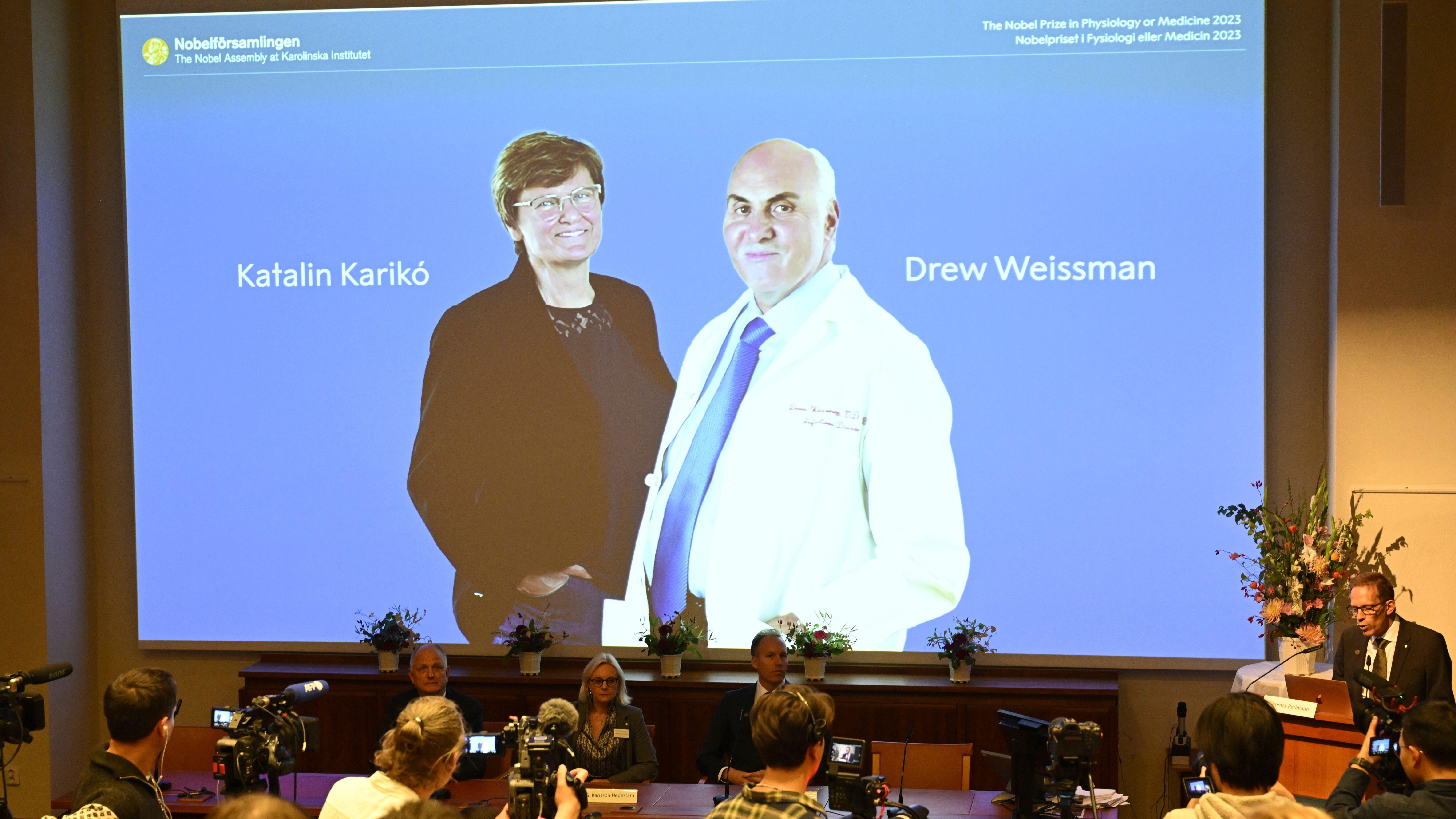Nobel Prize in medicine goes to scientists who paved the way for COVID-19 mRNA vaccines
Katalin Karikó and Dr. Drew Weissman won the 2023 Nobel Prize in medicine for their work on mRNA vaccines.

The 2023 Nobel prize in physiology or medicine has been awarded to two scientists who developed the messenger RNA vaccine technology used in the first effective shots against COVID-19.
Katalin Karikó, a professor at the University of Szeged in Hungary), and Dr. Drew Weissman, director of the Penn Institute for RNA Innovations, will share the 11 million Swedish krona ($1.02 million) prize.
The duo's work led to messenger RNA (mRNA) vaccines that do not generate an unwanted immune response, enabling the shots to enter the body without causing severe inflammation, the Royal Swedish Academy of Sciences in Stockholm said in a statement on Monday (Oct. 2). The COVID-19 vaccines made by Pfizer-BioNTech and Moderna are both built on the mRNA research developed by the scientists.
"mRNA vaccines, together with other COVID-19 vaccines, have been administered over 13 billion times," Rickard Sandberg, a member of the Nobel committee for physiology or medicine and the Royal Swedish Academy of Sciences, said during the committee's announcement on Monday. "Together [the two prize winners] have saved millions of lives, prevented severe COVID-19, reduced the overall disease burden, and enabled societies to open up again."
Related: 85% of COVID-19 long-haulers have multiple brain-related symptoms
Vaccines work by prodding the immune system into generating an immune response to a particular germ, such as a virus. Prior to the advent of mRNA vaccines, the first vaccines worked by introducing a killed or severely weakened version of the virus into the body, giving the immune system a chance to acquire immunity before it encounters the full-fledged pathogen.
Later developed vaccines contained proteins snatched from a virus's surface. Upon exposure to these proteins, immune cells make antibodies that can block them and the viruses they came from. There are also shots, such as Ebola vaccines, that use empty carrier viruses to transport DNA "blueprints" of a pathogen into the body, producing a similar effect, according to the Nobel committee statement.
Sign up for the Live Science daily newsletter now
Get the world’s most fascinating discoveries delivered straight to your inbox.
However, to manufacture vaccines like these, scientists have to cultivate large batches of cells, infect them with the necessary pathogens and then remove the viral and protein chunks necessary for the vaccine. This process is resource-intensive and slow, which can delay vaccine rollouts during outbreaks and pandemics.
To get around this, in the 1980s scientists began looking at more efficient ways of getting cells to make the required proteins. One method, called in vitro transcription, worked by generating mRNA (a molecule that transports instructions from DNA to the cell's protein construction factories) directly inside cells in culture.
But a huge hurdle remained: When animals were injected with lab-made mRNA, they experienced a massive immune response that led to dangerous levels of inflammation, destroying the vaccine and harming the animal.
The two prize winners refined the injected mRNA's building blocks (or nucleotides) to resemble those found in the body, meaning the immune response was no longer triggered.
In the early pandemic, this helped scientists to rapidly produce mRNA vaccines that acted against the coronavirus's "spike" protein — a pointy protein on the germ's surface.
The research has also opened the door for work on potential cancer vaccines and for the rapid development of vaccines in response to possible future viral threats, such as bird flu, the Nobel committee said in its announcement.
"During the biggest public health crisis of our lifetimes, vaccine developers relied upon the discoveries by Dr. Weissman and Dr. Karikó, which saved innumerable lives and paved a path out of the pandemic," Dr. J. Larry Jameson, executive vice president of the University of Pennsylvania for the Health System, said in a statement.
"Now, the same approach is being tested for other diseases and conditions," Jameson said. "More than 15 years after their visionary laboratory partnership, Kati and Drew have made an everlasting imprint on medicine."
In addition to the Nobel Prize, Karikó and Weissman previously won the Breakthrough Prize and Lasker-DeBakey Clinical Medical Research Award for their work on mRNA vaccines.

Ben Turner is a U.K. based staff writer at Live Science. He covers physics and astronomy, among other topics like tech and climate change. He graduated from University College London with a degree in particle physics before training as a journalist. When he's not writing, Ben enjoys reading literature, playing the guitar and embarrassing himself with chess.










